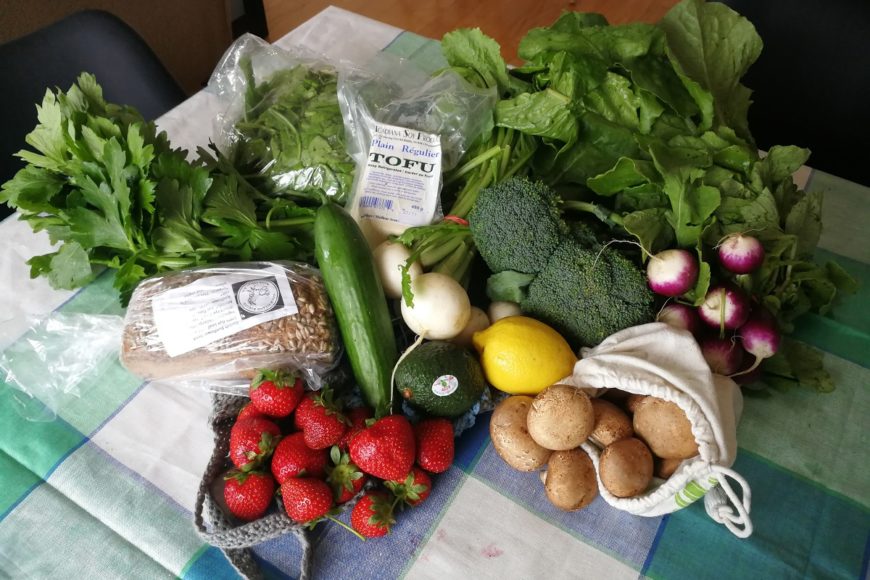
My Shop Local Grocery Challenge 2022
Shop local, they say. It’ll make you feel good, they say. Let’s put this to the ultimate test!
There has been lots of grocery talk lately, from inflation to shrinkflation, to the cops at the doors of your local Superstore (due to said inflation). Public servants protecting private interests…. with guns? What could go wrong?!
What kind of corporate stranglehold is this in a city that can’t even enforce basic traffic laws or effectively close off Spring Garden Road to cars? Meanwhile, the police force are asking for a budget increase because “people are exhausted, people are overworked” and the police chief is losing sleep over escalating gun violence but there are spare officers with extra time to stop poor people from interfering with corporate profits.
Housing and food are increasingly unaffordable, but Loblaws executives have been padding their pockets with pandemic profits (paying out millions of dollars in bonuses). And somehow they can’t reinstate the $2/hour pandemic raise to their front line workers (which was retracted after the first wave), but they can absolutely pay for expensive armed police at their many stores (note: 56% of Halifax police already receive salaries of $100,000+).
Can’t afford food? Let them eat cake. Or bullets. I dunno. Say what you want about it. It’s just not a good look, ya know?
Moving on…
There was also the whole #ButterGate fiasco, and debate about Canada’s dairy supply management. And more and more people are opening their eyes to the horrors of factory farming, the perils of monoculture, the scary reliance on petroleum fertilizers and patented seeds, and the environmental impacts of animal agriculture.
And we’ve witnessed how fragile the food system is during the pandemic – all it took was one ship lodged in the Suez Canel. Or two meat packing plants (those two plants accounting for 70% of Canada’s meat packing capabilities) having covid outbreaks (resulting in a price surge and farmers being forced to cull their animals). We are also seeing food shortages caused by the effects of global warming and political instability. We need the global market, and we need affordability. But we also need to support a robust local food system.
But the big supermarkets don’t even support our local agriculture. Loblaws and Sobeys have policies disallowing the sale of provincially inspected meat. There are no federal inspection facilities here for beef or pork, so guess what? No local meat in the supermarkets. And then there is the lack of local, seasonal produce.
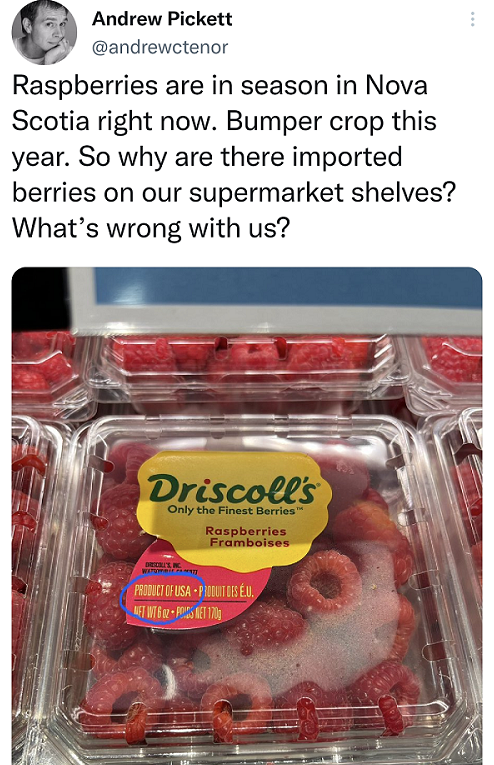
But I was prompted to write this post by something rather petty and apolitical. I heard that Sobeys was getting rid of AirMiles and I was aghast! But it got me thinking: am I really so married to a loyalty card that I shower my dollars on these corporate giants? Sure, I’ve taken a few trips on my AirMiles. But the promotions are strategically manufactured to make me spend more money than I normally would. In fact, everything about these supermarkets is engineered to make us spend spend spend! – mostly on processed foods.
I decided that I wanted to see if I could subsist entirely on butchers, bakers and candlestick makers. Or, you know, small independent grocers, convenience stores, and farmers markets.
The challenge, precisely, was this: can I go one month without stepping foot into a supermarket? Is it really feasible to exclusively shop local?
I live in the North End of Halifax which is blessed with so many options to shop local. I decided to stick to a walkable radius of 15 minutes, but most of my groceries were acquired by bike. After all, part of the “shop local” ethos is to reduce emissions. In the spirit of environmental stewardship, I also decided to stick to predominantly plant-based foods. Other considerations are that there are two people in my household: myself and The Side Dish (wife). And it’s summer, so lots of things are growing.
And let me preface this by saying I realize this isn’t realistic for everyone. Many people live in food deserts, have children and other logistical, geographical, mobility and time restrictions. This was a challenge for me, in my circumstances, to see how it would affect my lifestyle and expenditures. Sure, the low prices at the supermarkets are tempting, and many of us have no choice but to shop for the lowest possible prices.
But what is the true cost of these low prices?
And is it actually that much more expensive to shop local?
I started out fresh off a vacation, and I had a very empty fridge.
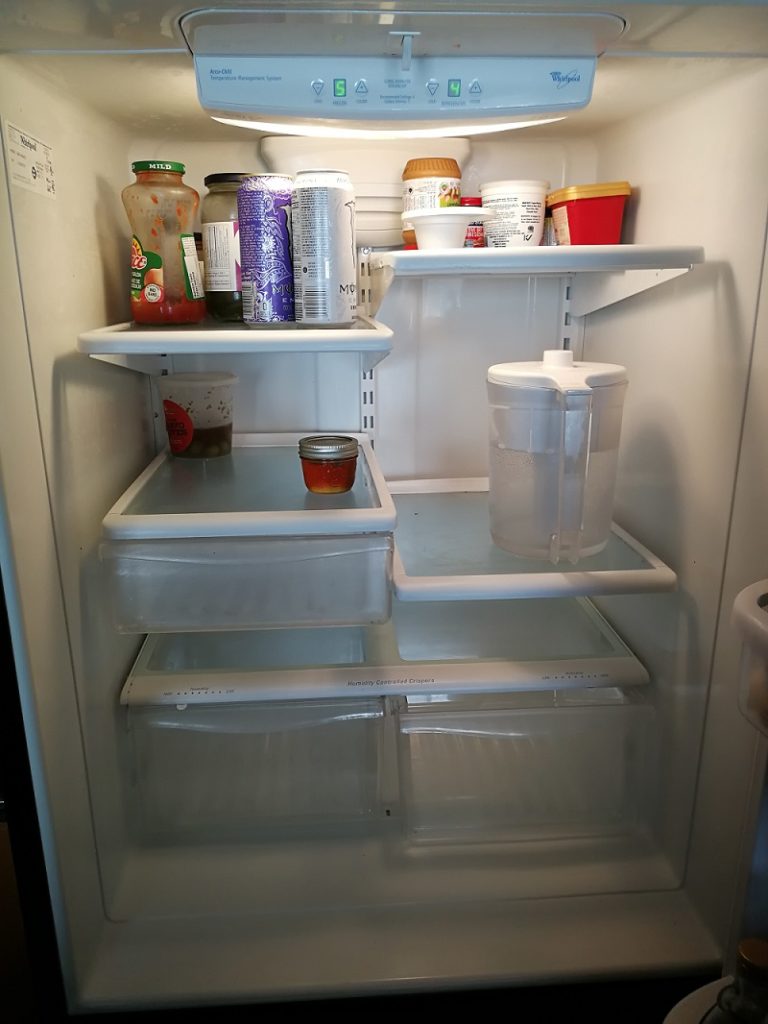
I had a decently stocked pantry, and a hoarders’ worth of toilet paper, so I wasn’t starting from scratch, but did have some replenishing to do.
*Note: I have showcased my biggest grocery hauls below, but there were various other trips to convenience stores that will be reflected in the total.
Luke’s Small Goods – $22
2393 Agricola Street
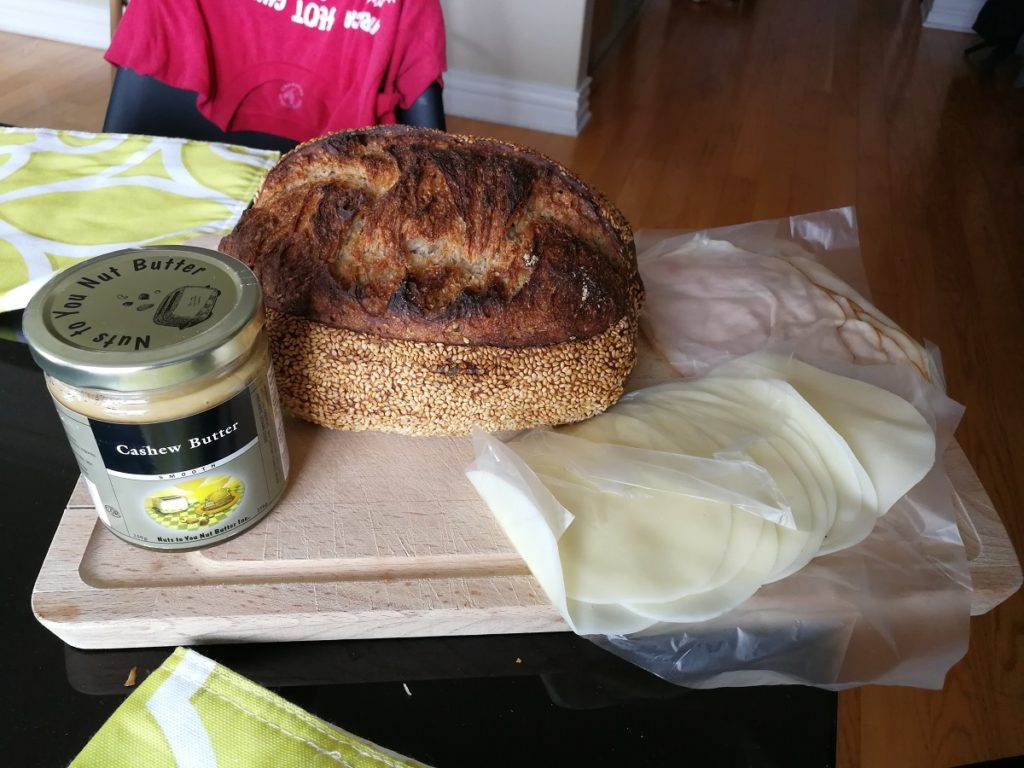
We were too tired after our vacation to jump right into things, so my first stop was Luke’s Small Goods for some sourdough rye and deli sandwich fixings. There is also a small grocery section, so I picked up some cashew butter.
Local Source – $64
2530 Agricola Street / 2790 Windsor Street
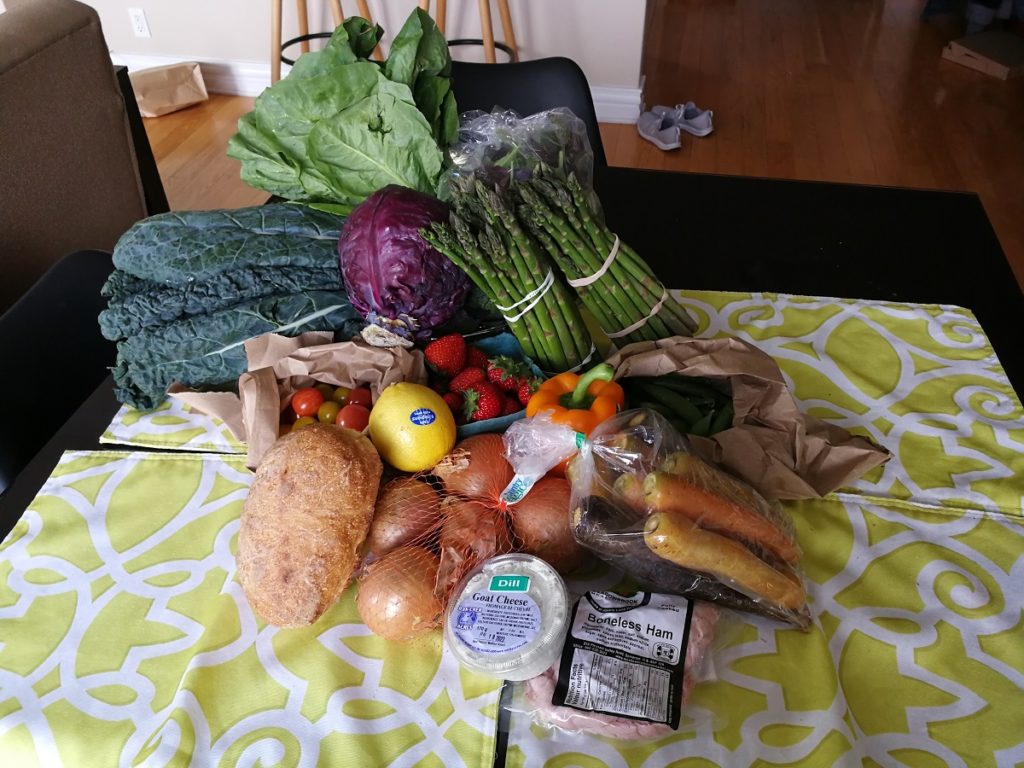
We missed the farmer’s markets on Saturday, so we ended up at Local Source, which is almost like a mini farmers market consolidated into one store. If you are looking to shop local, this is quite literally your local source.
Our haul consisted of: local strawberries, baby tomatoes, snap peas, orange bell pepper, purple cabbage, black kale, romain lettuce, asparagus (which was 2-for-1!), carrots, onions, a lemon, Meadowbrook ham, Rancher Acres goat cheese, and a loaf of olive bread.
The Tare Shop – $59.36
5539 Cornwallis Street (Halifax) / 21 Portland St Unit 1 (Dartmouth)
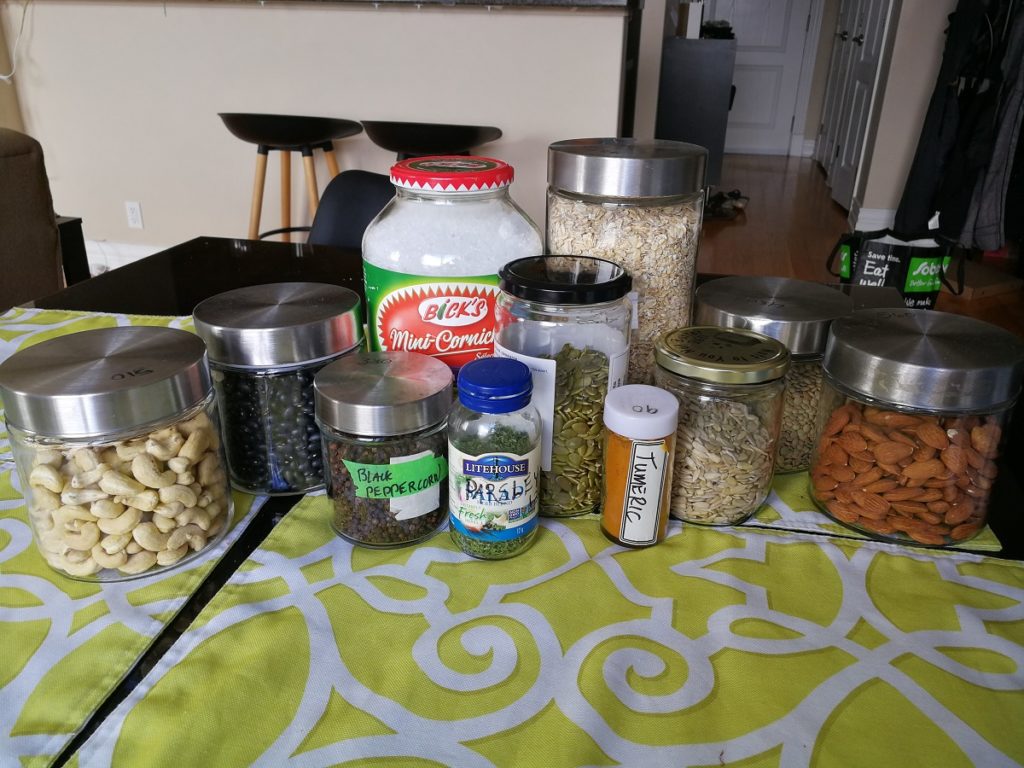
Later than week, I made a trip to the Tare Shop because I was out of a few of my most-used pantry items. The Tare Shop is a zero waste concept, which means you need to bring your own containers, and goods are sold by weight. I get most of my dry goods here, as well as my nuts and seeds which are sold refrigerated for freshness. I find the prices very competitive. For example, that container of turmeric was only 40 cents.
My haul: cashews, almonds, black beans, green lentils, oats, pumpkin seeds, sunflower seeds, black peppercorns, parsley, turmeric, epsom salts.
Forum Farmer’s Market – $67.50
+ Local Source – $35.89
Total: $103
The Halifax Forum: Windsor St & Young St, Halifax
Saturdays, year round: 8am-1pm.
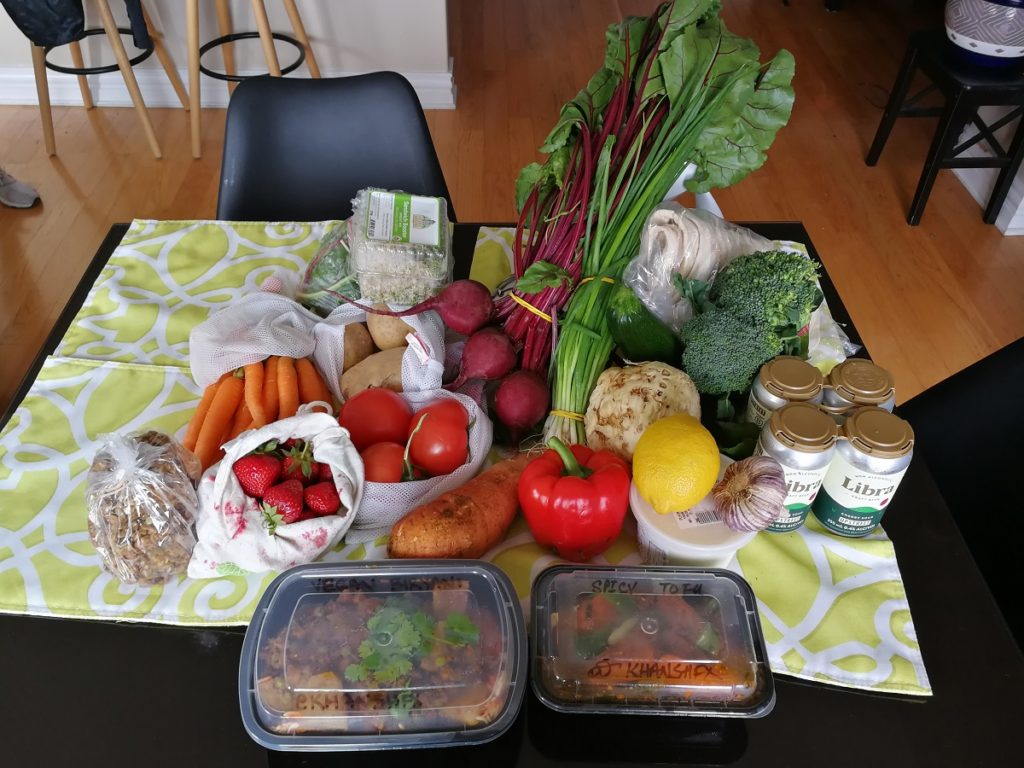
The following Saturday we made it to the Forum Market.
Our haul: mixed baby greens, broccoli, celery root, tomatoes, carrots, green onions, strawberries, red bell pepper, sweet potato, potatoes, zucchini, sprouts, as well as some flatbread and prepared meals from Khan’s.
We also stopped in at Local Source on the way home for some Libra non-alcoholic beer, cookies, yogurt, garlic, and a lemon.
Springhouse Market – $74
+ Real Fake Meats – $23
Total: $97
2290 & 2278 Gottingen Street
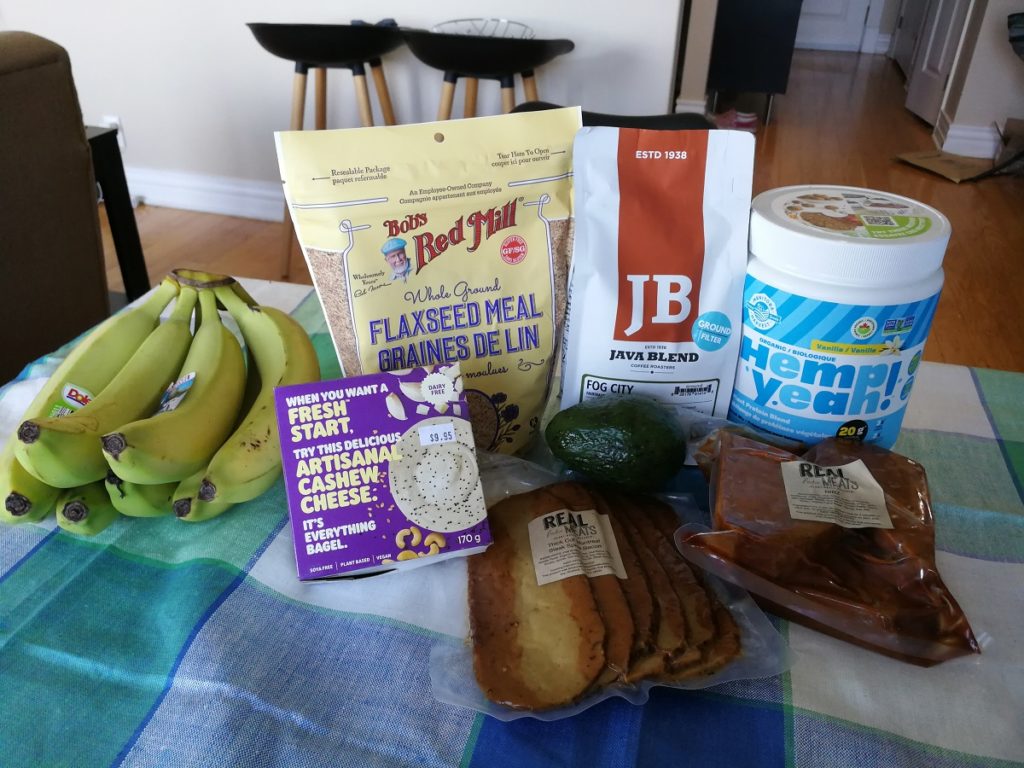
Later than week, I stopped in at Springhouse Market (a vegan grocery) and Real Fake Meats (a vegan butcher). These two businesses are neighbours on Gottingen Street, and combined they are the perfect plant-based grocery destination. (Both stores have delicious take-out as well).
In addition to a freezer full of house-made soups/meals, Springhouse has lots of pantry items, a fridge of vegan grocery products, and a small produce section. I was able to score bananas and an avocado (which don’t open appear at farmers markets).
My haul consisted of: Java Blend coffee, ground flaxseed, bananas, avocado, protein powder (the bulk of the expense), and Fresh Start Fromage (Everything Bagel spread).
And from Real Fake Meats: vegan ribs and bacon.
Warehouse Market – $50
2867 Isleville Street
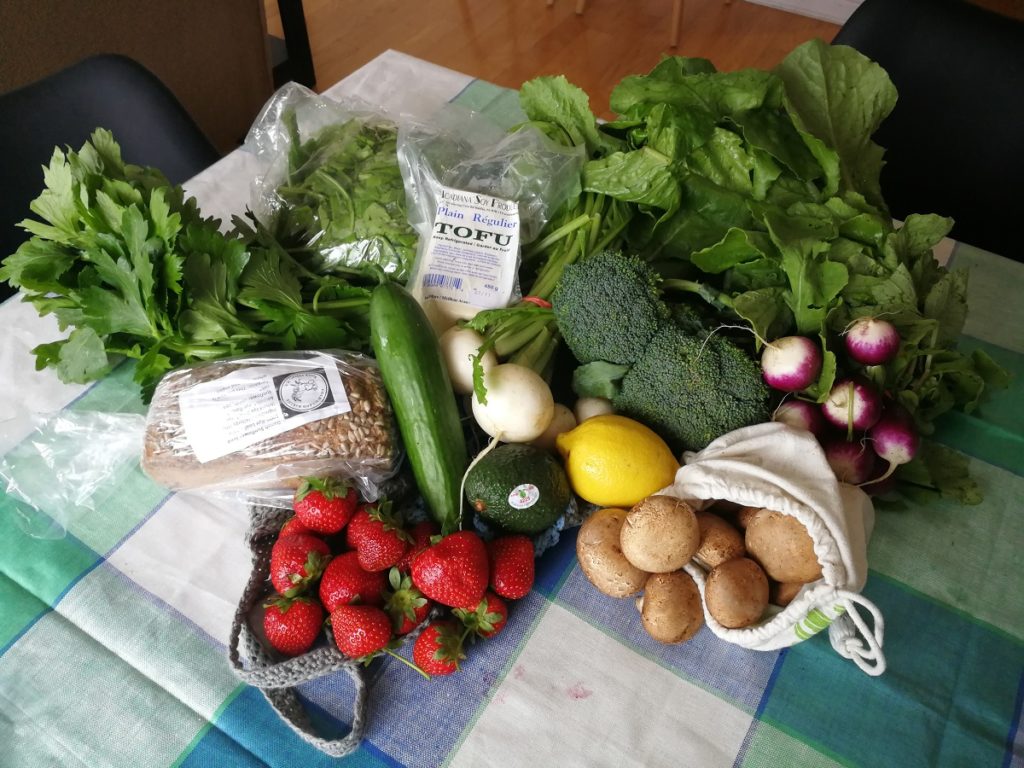
The next week I ventured to the Warehouse Market, which is a combination of Espresso 46 (coffee), Abundant Acre Farms (produce), Holdenca Farms (pastured meat), and Afishionado (seafood). There are also products available from other local producers.
What I really like about the Warehouse Market is that it’s open from Wednesday to Friday, 11am-6pm, and Sat 9am-4pm. This makes it much more accessible for those of us who work nights and weekends. They also sell a few conventional produce items like bananas, lemons, and avocados. I was super happy to find loose mushrooms here (because I refuse to buy those sold in plastic containers).
My haul included: strawberries, mushrooms, avocado, lemon, radishes, broccoli, cucumber, salad turnips w/ greens, celery, arugula, romain lettuce, Gold Island Bakery sourdough rye, Acadiana tofu.
Mid East Food Centre – $33.25
2595 Agricola Street
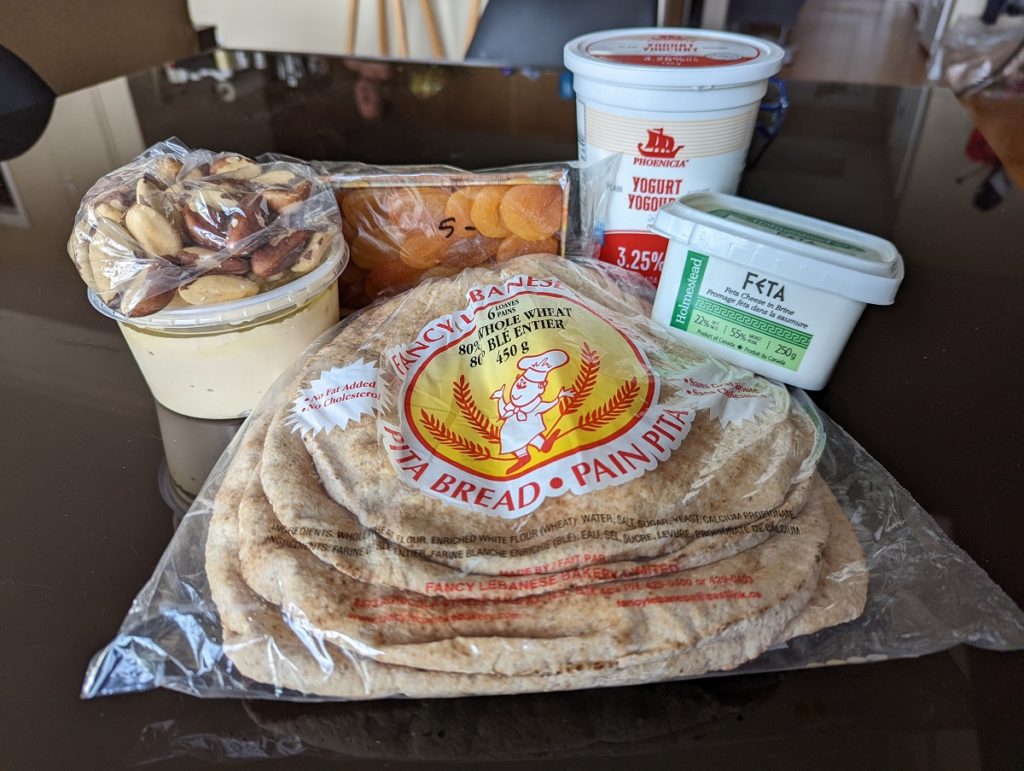
My next trip was to the Mid East Food Centre, an iconic local gem that is sadly being forced to shut down next month due to a rent increase. (Hopefully to resurface somewhere in the same neighbourhood). This is the only place I will buy pita bread, because it’s right next to the Fancy Lebanese Bakery so it’s always fresh. There are also bulk grains, legumes and spices, pickled things, jars and cans (including my go-tos: sardines, tahini, and pickled turnip). Also, a whole fridge and freezer full of all kinds of stuff.
My haul: pita bread, hummus, Homestead Feta, yogurt, Brazil nuts, dried apricots.
Findings & Discussion:
Some things were actually cheaper! Bulk goods at the Tare Shop are surprisingly affordable, and international grocers often have better prices on certain items than the supermarkets. People assume that it is more expensive to shop local, but this isn’t always the case!
Fruits and vegetables were much higher quality! My produce was fresher and better tasting than conventional supermarket produce. Since it was fresher, it also lasted longer. Less food waste!
Less packaging! One of the most compelling reasons to shop this way is that there is very little packaging. I always use re-useable grocery bags and produce bags, but supermarkets like to sell certain items in cellophane and styrofoam. But at farmers markets, produce is almost always sold loose, and the Tare Shop is all about reusing containers. Also – the Warehouse Market will collect your empty berry quart containers and the Tare Shop will collect your empty yogurt containers to reuse. And before you say: “But I recycle!”, a gentle reminder that REDUCE and REUSE come before recycling and for good reason (that I don’t have room to go into here. Google “recycling myths”).
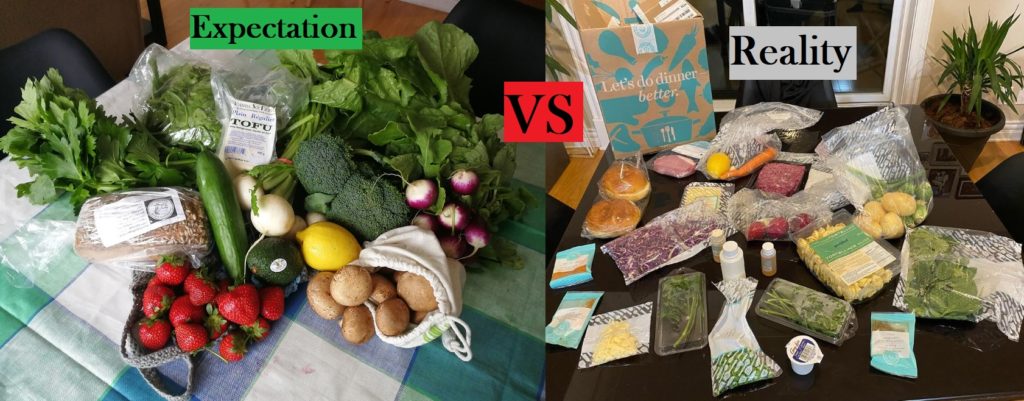
I felt more connected to my community. It is nice to be out in the neighbourhood interacting with people, as opposed to the alienating experience of cars and supermarket aisles, where the outside world and the people in it are experienced as obstacles and nuisances. The act of grocery shopping can be an event or it can be a task, depending on perspective and privilege.
There were some products that were challenging to acquire. I had to get my soy milk at the Irving (and they don’t even carry the unsweetened stuff), and my frozen berries at Shoppers. This isn’t exactly in the spirit of “shop local”. Another troubling detail was that Krispi Kraut sauerkraut, despite being an iconic local brand, was nowhere to be found. There are lots of artisanal ferments around, but they are typically $10-15/jar.
It is more time consuming to shop at different stores, so it can be especially frustrating when the thing you want is out of stock (which is more likely to happen at a smaller store). It also requires forethought and toil to bring your own bags and lug around containers.
You don’t have as much control. Shopping local means that you are more limited by seasonality and what’s in stock. You can’t just make a grocery list based on the meals you want to make. You have to improvise meals out of the food you were able to acquire that week. This is a potential deterrent to those without kitchen prowess. On the flipside, I think it is good to know where your food comes from and that you can’t just get whatever you want whenever you want because it literally isn’t growing yet. There could be a bumper crop or there could be a blight. There is a certain humbling and groundedness when you are dependant on nature. I can’t imagine trying to do this in the winter!
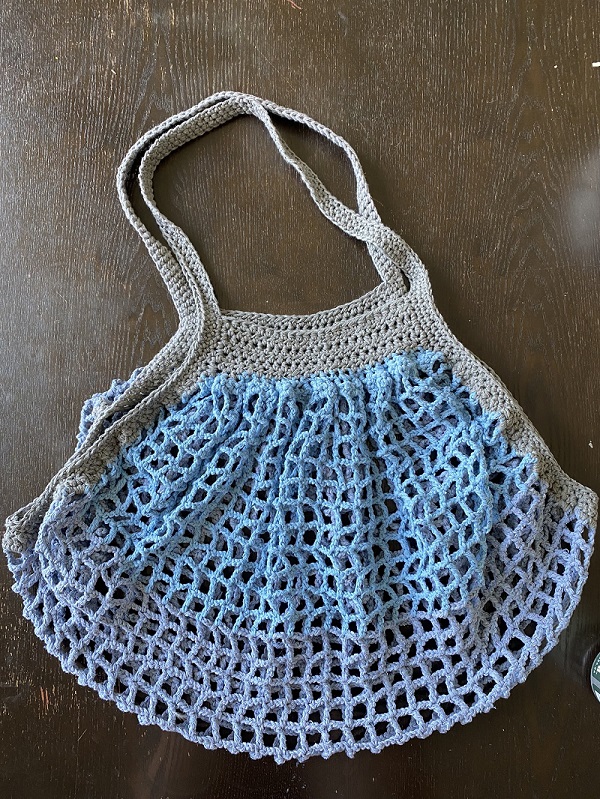
Shop Local One Month Total:
$665.78
However, I’m embarrassed to say that $170 of that was convenience store spending, i.e. mostly junk food. Yikes!
If you substract that from the total, (Doritos go into the entertainment budget, right?), my actual grocery total is roughly:
$500, or $125/week
A couple more caveats: other than some deli meats and a bit of dairy, this was a plant-based grocery average. I was inspired, in part, to write this post after seeing inflation posts on social media with picture’s of grocery carts, priced at $100 with only a few measly items (mostly meat). I thought to myself: you could fill that cart if you were plant-based! Plant-based diets are the most affordable diets in the world, but they may not be appropriate for every household. Meat, especially local meat, is going to make things much more expensive. My philosophy is to eat better meat less often, so I try to support local farmers as much as I can.
Caveat #2 is that I eat out at restaurants more often than most. The more you dine out/get takeaway, theoretically the less you’ll spend on groceries. However, I know I could have survived on the same amount of groceries despite my consumer habits. If anything, I have found that unbridled restaurant eating results in food waste. It can be challenging to eat the dredges of your refrigerator when tasty restaurants abound.
Caveat #3: I didn’t need toilet paper or laundry detergent, etc. The Tare Shop does sell cleaning products (and reusable toilet paper lol!) but these are items I will likely continue to get at the supermarkets.
In Conclusion:
I really enjoyed this experience and I will continue to shop at local markets for the majority of my produce (ask me again in winter), and I will continue shopping at The Tare Shop for my dry goods. I’m committed to popping into international grocers for whimsical purchases, or for staple items they stock.
I will continue to shop at Sobeys for a few key items: frozen berries, protein powder, frozen spinach/kale, soy milk, toilet paper, etc.
I will reintroduce Pete’s Frootique into the mix (especially during the winter), which actually has competitive prices, contrary to popular belief, and very nice produce. It’s too bad they are owned by Sobeys now, but I haven’t noticed many changes.
I wanted to attach a full list of all of the North End grocers, as well as some great options in other neighbourhoods, but I think I’ll leave that for a dedicated “Shop Local” guide. I hope you enjoyed reading about my experiment. If you have any questions or comments, hit me up on Twitter or comment below.
1 Comment
Ann
I am so with you about the corporate greed, it’s disgusting! I was so mad when Weston had the adacity to take away the $2 pandmic wage whilst he and his croneys were raking in the money hand over fist. Shopping local like that is more difficult in suburbs. But I would love to check out some of those little stores you mentioned. I need to do better.
Happy summer to you and Side Dish
Ann